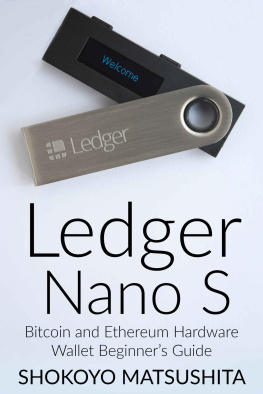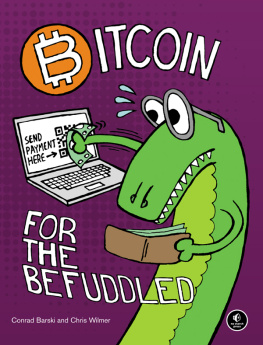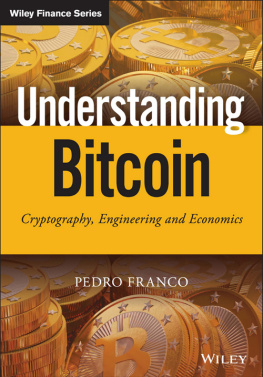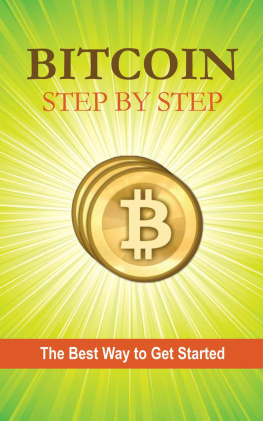Thank you for downloading this book about bitcoin, the father of digital currencies.
Much myth and misinformation exists around bitcoin, and indeed all cryptocurrencies. From the misplaced and ill-informed assumptions that everybody using them is either a terrorist or master criminal, existing in some dark underworld of lawlessness and moral weakness, to a belief that they are just the flash in the pan plaything of techy geeks.
This book seeks to dispel these myths and share the truth about bitcoin.
It will discuss with you the advantages of bitcoin: safety, privacy, security. But will also not pull back from highlighting the uncertainty of the new which surrounds digital currency.
From reading the book, you will discover how to buy, store and trade with bitcoin. The best ways to use the currency as an investment, the risks and potential rewards of doing so. You will learn about mining, including ways to take part.
And most of all, you will gain a perspective about the financial innovation which will help you to see it in the context of physical currencies such as the dollar, Euro and pound. To gain an insight into ways in which digital currencies are changing the way we trade, and how major institutions are getting in on the act.
After reading this book you will have a strong understanding of bitcoin, and know where to go to further your knowledge.
It might only have been around since 2008, but bitcoin has already changed many peoples lives. Further, it seems inevitable that we will all become more exposed to it over the coming few years. Those in the know will be able to make use of bitcoin for their own purposes, taking advantage of its speed of transaction and opportunities for trade without a middle man.
The use of bitcoin by major banks is almost upon us; bitcoin ATMs are already to be found in many cities; traders such as Amazon and Microsoft have embraced it. It IS going to become a part of our lives, and we owe it to ourselves to be ready for this.
Take the opportunity now to learn about bitcoin in this easy to read guide. At the end, you will not only know about the currency, but hopefully you will be inspired to get in on the act yourself.
The time to invest in your own bitcoin supply might just be around the corner.
Chapter One: What is Bitcoin
As much as discovering what Bitcoin actually is, it is definitely helpful to learn what it is not.
The definition of Bitcoin is fairly straightforward. It is a global currency, accepted in most parts of the world, that exists only online.
Consider the moneys of the world - dollars, pounds sterling, the euro, the rouble and so on,. Collectively known as fiat currencies, these are monies that have no intrinsic value in their own right, but have built up and maintained a worth based on the economic success of the nation they represent.
To illustrate this point, imagine that the US Dollar suddenly ceased to be the money of the nation. Many of us, around the world as well as in the United States, would have small, rectangular copies of printed paper. Suddenly, these pieces of paper would be worthless. They have no value as a piece of paper.
In this respect, Bitcoin is like fiat currency in that, taken out of the online world in which it flourishes, it becomes just a series of numbers, a code, but within the internet, Bitcoin has considerable value.
But let us focus now on how this currency differs from your standard currency.
How Does Bitcoin Differ From Fiat Currency?
A Complex Way To Buy Your Daily Cappuccino
Firstly, although it may be worthless in its own right, a fiat currency has a physical form. This is the dollar bill or pound coin that can sit in your pocket. That you can exchange for goods, such as a cup of coffee or a bar of chocolate.
Bitcoin is different. The closest it gets to a physical form is the complex code in which it is stored, traded and bought. Therefore, although it could be used to buy a coffee from a store that accepted it, you are probably better off to use your normal cash. As things currently stand, it is just easier.
Bitcoin takes the form of a code.
There is No Middle Man
If you think about it, whenever you use your normal bank account, a third party is involved. That is, your bank. This financial institution has access to the amount of money you have, knows your spending pattern, can track your interests. The bank knows all but your cash transactions (and even then, knows when you take the cash out to spend). It acts as a facilitator, and most likely charges you for the pleasure of doing so.
The same applies if you use a credit card, or take advantage of the rapidly developing escrow type services such as Paypal.
Bitcoin is different. Transactions using the online coin are peer to peer, that means that the money goes straight from one wallet (more on these later) to another. Straight from buyer to seller.
No third party has access.
This offers beneficial opportunities for cost (there is no fee involved), security and privacy.
A Different Kind Of Privacy
Unless your normal bank account is hacked, the details within it are moderately private. Whilst there is no public scrutiny, clearly your bank, and its employees, can view your account. Similarly, following proper procedures, authorities such as tax agencies can also gain access. Your account could be frozen, or delays put on your access.
None of this applies with Bitcoin. The code (called your private key) which holds the amount of bitcoin you own is accessible only to you. There are no means by which it can be shared, other than to have it hacked from out of your own storage system.
This has obvious advantages of privacy, but does present a potential problem. After all, if nobody other than you know the amount of currency you hold, it should be possible to cheat on the amount possessed.
But bitcoin has the solution. Using blockchain technology (another area we will investigate in much more detail later) a record is made of every transaction that takes place. These details are available to every user in all respects except one the identity of the users.
This means that every use of bitcoin is recorded. The records are held on parts of blockchain technology called public ledgers and they ensure that there can be no crookedness surrounding the exchange of the currency.
A Global Currency
Most of us will have experienced the thrill of going on holiday to another country. Learning of the culture, the geography and the climate of the foreign place. Therefore, we will also have learned of the issue of getting our hands on our spending money.
Firstly, you have to convert your own currency into that of the country you are visiting. You have to decide in the form you will take it probably a small amount of cash (in case of theft), perhaps a pre-loaded card or credit card.
What you also know is that it will cost you to get the new currency in the first place, perhaps in the form of a direct fee, or additional charges on your card, or in a not too generous exchange rate. You also know that, short of major economic change while you were away, you will get a worse rate when you try to change it back.
Bitcoin avoids these problems. There is an exchange rate against other altcoins (types of digital currency that are NOT Bitcoin, such as Litecoin or Ethereum) and also against the fiat currency you may use to buy them in the first place, but that rate is driven very much by the users, not the financial institutions, seeking profit, and the national Governments, seeking to manage economic performance.


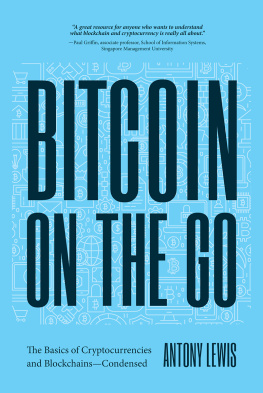
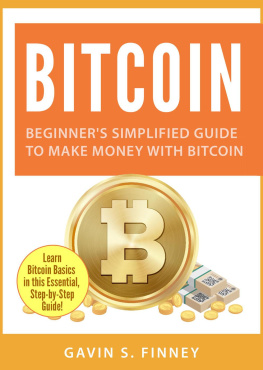
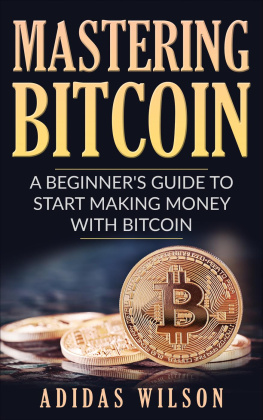
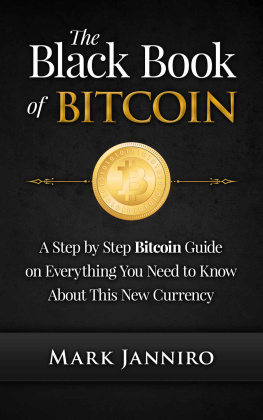
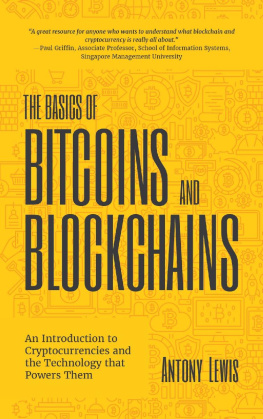
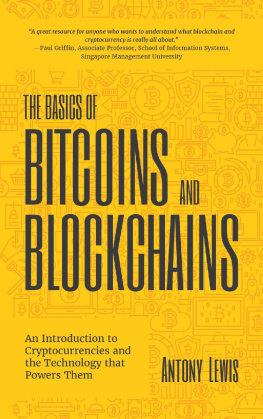
![Pedro Franco [Pedro Franco] - Understanding Bitcoin: Cryptography, Engineering and Economics](/uploads/posts/book/119679/thumbs/pedro-franco-pedro-franco-understanding.jpg)
